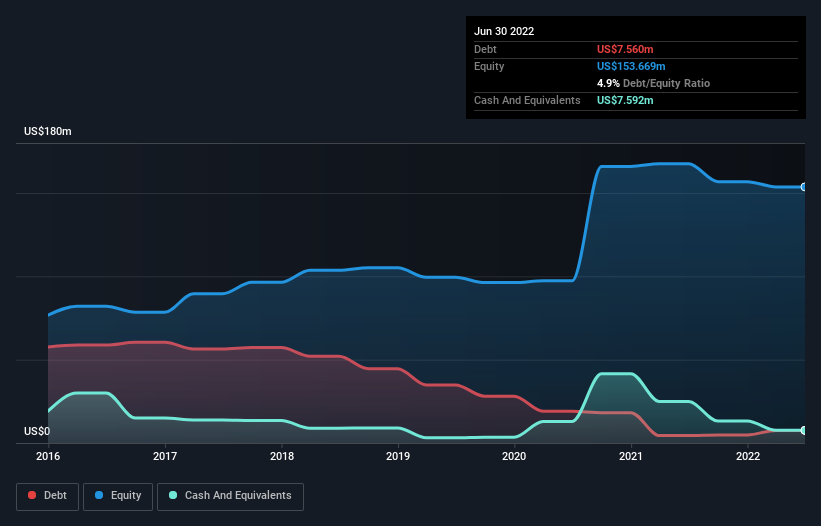
Warren Buffett famously said, 'Volatility is far from synonymous with risk.' When we think about how risky a company is, we always like to look at its use of debt, since debt overload can lead to ruin. As with many other companies Shanta Gold Limited (LON:SHG) makes use of debt. But the real question is whether this debt is making the company risky.
When Is Debt A Problem?
Debt and other liabilities become risky for a business when it cannot easily fulfill those obligations, either with free cash flow or by raising capital at an attractive price. In the worst case scenario, a company can go bankrupt if it cannot pay its creditors. However, a more frequent (but still costly) occurrence is where a company must issue shares at bargain-basement prices, permanently diluting shareholders, just to shore up its balance sheet. Of course, debt can be an important tool in businesses, particularly capital heavy businesses. The first step when considering a company's debt levels is to consider its cash and debt together.
See our latest analysis for Shanta Gold
How Much Debt Does Shanta Gold Carry?
The image below, which you can click on for greater detail, shows that at June 2022 Shanta Gold had debt of US$7.56m, up from US$4.43m in one year. But it also has US$7.59m in cash to offset that, meaning it has US$32.0k net cash.

How Healthy Is Shanta Gold's Balance Sheet?
According to the last reported balance sheet, Shanta Gold had liabilities of US$37.0m due within 12 months, and liabilities of US$22.9m due beyond 12 months. Offsetting these obligations, it had cash of US$7.59m as well as receivables valued at US$6.81m due within 12 months. So its liabilities total US$45.4m more than the combination of its cash and short-term receivables.
While this might seem like a lot, it is not so bad since Shanta Gold has a market capitalization of US$148.0m, and so it could probably strengthen its balance sheet by raising capital if it needed to. But we definitely want to keep our eyes open to indications that its debt is bringing too much risk. Despite its noteworthy liabilities, Shanta Gold boasts net cash, so it's fair to say it does not have a heavy debt load! When analysing debt levels, the balance sheet is the obvious place to start. But ultimately the future profitability of the business will decide if Shanta Gold can strengthen its balance sheet over time. So if you're focused on the future you can check out this free report showing analyst profit forecasts.
Over 12 months, Shanta Gold made a loss at the EBIT level, and saw its revenue drop to US$98m, which is a fall of 26%. That makes us nervous, to say the least.
So How Risky Is Shanta Gold?
We have no doubt that loss making companies are, in general, riskier than profitable ones. And in the last year Shanta Gold had an earnings before interest and tax (EBIT) loss, truth be told. Indeed, in that time it burnt through US$19m of cash and made a loss of US$12m. Given it only has net cash of US$32.0k, the company may need to raise more capital if it doesn't reach break-even soon. Overall, we'd say the stock is a bit risky, and we're usually very cautious until we see positive free cash flow. The balance sheet is clearly the area to focus on when you are analysing debt. However, not all investment risk resides within the balance sheet - far from it. For example, we've discovered 1 warning sign for Shanta Gold that you should be aware of before investing here.
Of course, if you're the type of investor who prefers buying stocks without the burden of debt, then don't hesitate to discover our exclusive list of net cash growth stocks, today.
If you're looking to trade Shanta Gold, open an account with the lowest-cost platform trusted by professionals, Interactive Brokers.
With clients in over 200 countries and territories, and access to 160 markets, IBKR lets you trade stocks, options, futures, forex, bonds and funds from a single integrated account.
Enjoy no hidden fees, no account minimums, and FX conversion rates as low as 0.03%, far better than what most brokers offer.
Sponsored ContentNew: Manage All Your Stock Portfolios in One Place
We've created the ultimate portfolio companion for stock investors, and it's free.
• Connect an unlimited number of Portfolios and see your total in one currency
• Be alerted to new Warning Signs or Risks via email or mobile
• Track the Fair Value of your stocks
Have feedback on this article? Concerned about the content? Get in touch with us directly. Alternatively, email editorial-team (at) simplywallst.com.
This article by Simply Wall St is general in nature. We provide commentary based on historical data and analyst forecasts only using an unbiased methodology and our articles are not intended to be financial advice. It does not constitute a recommendation to buy or sell any stock, and does not take account of your objectives, or your financial situation. We aim to bring you long-term focused analysis driven by fundamental data. Note that our analysis may not factor in the latest price-sensitive company announcements or qualitative material. Simply Wall St has no position in any stocks mentioned.
About AIM:SHG
Shanta Gold
Shanta Gold Limited, together with its subsidiaries, engages in the exploration, development, and production of gold in East Africa.
Flawless balance sheet with acceptable track record.
Similar Companies
Market Insights
Community Narratives




